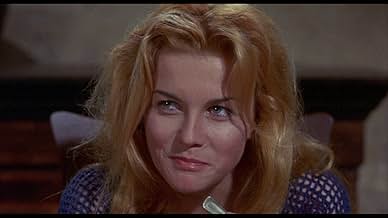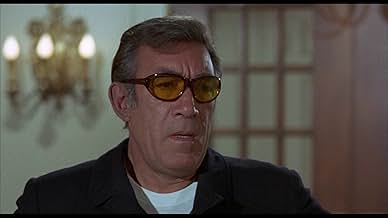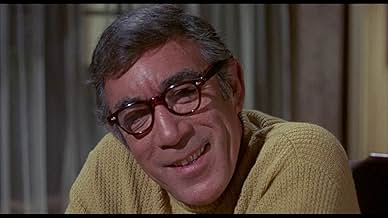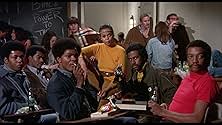Ajouter une intrigue dans votre langueR.P.M. stands for (political) revolutions per minute. Anthony Quinn plays a liberal college professor at a west coast college during the heady days of campus activism in the late 1960's. Rad... Tout lireR.P.M. stands for (political) revolutions per minute. Anthony Quinn plays a liberal college professor at a west coast college during the heady days of campus activism in the late 1960's. Radical students take over the college, the president resigns, and Quinn's character, who has... Tout lireR.P.M. stands for (political) revolutions per minute. Anthony Quinn plays a liberal college professor at a west coast college during the heady days of campus activism in the late 1960's. Radical students take over the college, the president resigns, and Quinn's character, who has always been a champion of student activism, is appointed president.
- Estella
- (as Ines Pedroza)
Avis à la une
The campus radicals, led by 33-year-old long-haired undergraduate Gary Lockwood, have occupied one of the buildings on campus, and have a list of demands. One of them is that the students should hire the faculty. (After being in academia for 40 years, I will admit they may be on to something.) Token black radical Paul Winfield also wants a black man on the Board of Trustees. When Quinn suggests a candidate, Winfield wants to know how black he is. Quinn asks if he wants a skin sample. One of the trustees points out that there are no engineering students taking part in the rebellion; just English and psychology majors. That's the extent of the hilarity in this film.
Now settle in for lots of blather and inaction, as the students accuse Quinn of being part of the "establishment." There are a couple of "right-ons" and other dialogue I could not understand. Lockwood et al finally threaten to destroy the campus computer (Lockwood is apparently still ticked off at HAL). Enter the club-wielding campus police, who, oddly, are not referred to as the "fuzz" or even "pigs." What kind of campus is this? A few skulls get cracked, butts get kicked, all this while director Stanley Kramer shoots the scenes through a blurred lens. Great. The one time we finally get some action, and we might as well be underwater. There was probably more violence taking place in theaters, as audiences rushed to the exits.
In the final scene, Quinn tells Lockwood to "stay loose, man." Then Melanie sings a song.
But here's the insulting part of the film, why dear vibrant, sexy Tony should never have taken the part: he's shown as over-the-hill and unable to relate to the wild generation. He wears reading glasses, he takes terrible insults from the students, and his girlfriend tells him "Pull in your gut" when he walks around naked. (Sorry ladies, he's given a flesh-colored thong to protect his modesty.) One could argue that he's still young and hip enough to go to bed with Ann-Margret, but as the movie progresses, the students are so disrespectful, they show the real generation gap: manners and decency. Even though Tony doesn't agree with the kids, he still tries to treat them with respect, but the angry, protesting teenagers don't give him the same courtesy.
There will be a large chunk of audience members who side with the teenagers, and that makes me both sad and disgusted. Manners never go out of style, and using them doesn't show weakness or inflexibility. It shows class, the ability to see the bigger picture, and maturity. Tony may belong to the older generation with graying hair and a growing tummy, but I'll happily join him any day of the week.
Erich Segal's script is trite and hardly rises above comic-book level. Concerning the film's direction, where is the genuine emotion and character development? Anthony Quinn is always good, but in this movie he is miscast. Worse, 30 year-old Ann-Margret's performance as a collegian is ludicrous; she is way too old to be a typical grad student. As she does not exactly radiate intelligentsia, one wonders how she ever became an undergraduate. The impression does arise that she may have earned her bachelor's degree by lying on her back. Chemistry is lacking between her and lover Quinn, whom she even calls a hypocrite. Both Lockwood and Winfield are also too old for their respective characters.
The late 1960s and early 1970s was a time of college campus radicalization, although the students on the far left comprised only a small percentage of the school population. But they were both vocal and active. They were quite volatile, hence R.P.M. = Revolutions per Minute. All in all, this pointless movie certainly shows its age.
Anthony Quinn is a popular sociology professor of Hispanic heritage and has something of a following among the radical left on campus. When President John Zaremba just resigns in frustration because he can't deal with a bunch of students occupying the campus administration building. Quinn also has a student mistress in the person of Ann-Margret a rather open secret on campus.
The Board of Trustees decide on what they consider a master stroke, make the popular Quinn the new president because they think he can talk the radical talk and make them walk. It doesn't quite work out that way as Quinn all too well realizes that he's now part of the 'establishment'.
The students who are all too old to be playing campus radicals include spokesperson Gary Lockwood and black student leader Paul Winfield. Fine players but all showing their age. Ann-Margret is a graduate student, but even she looks a bit old to be college coed.
It ends in a scene that was all too familiar in the Sixties, police raiding the school and making arrests. At some point the students have to get back to the business of education.
Fascinating that the big threat they had was to destroy the giant computer that the college had if they didn't get their way. Now Bill Gates and the late Steve Jobs would have a fainting spell dare they suggest such a thing.
R.P.M. marked the beginning of when director Stanley Kramer started to lose his muse. It is truly truly dated.
Le saviez-vous
- AnecdotesStanley Kramer always referred to this film in interviews as his least favorite and least successful of the films he has directed.
- Citations
Prof. F.W.J. 'Paco' Perez: "Lickety split"? Where do you get your vocabulary?
- Crédits fousAs the opening credits roll, the screen flips like a coin-like wipe with the text appearing in the center of the "coin".
- ConnexionsFeatured in Two Sides of the Coin: The Songs and Music of 'R.P.M.' (2019)
- Bandes originalesStop! I Don't Wanna' Hear It Anymore
Written by Barry De Vorzon & Perry Botkin Jr.
Additional lyrics by Melanie
Performed by Melanie
Courtesy of Buddah Records
Meilleurs choix
- How long is R.P.M.?Alimenté par Alexa
Détails
- Date de sortie
- Pays d’origine
- Langue
- Aussi connu sous le nom de
- R.P.M. */* Revolutions per minute
- Lieux de tournage
- Société de production
- Voir plus de crédits d'entreprise sur IMDbPro
- Durée1 heure 32 minutes
- Mixage
- Rapport de forme
- 1.85 : 1


















